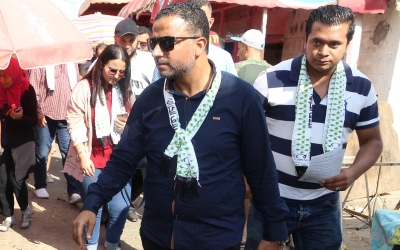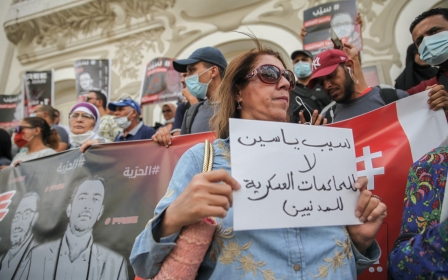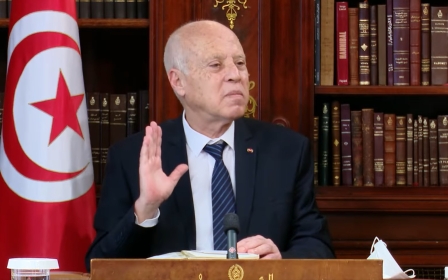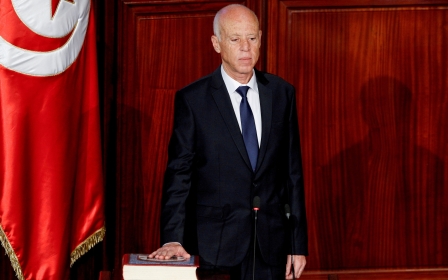Tunisian police violently arrest lawmaker hostile to President Kais Saied
A Tunisian politician fiercely opposed to President Kais Saied was violently arrested by plain-clothed police officers on Friday as he attempted to enter a military court and appear before an investigating judge, his party said.
The Dignity Coalition (al-Karama) said in a statement that Seifeddine Makhlouf was "kidnapped" as he attempted to enter the judiciary to address a criminal complaint.
According to a video of the arrest posted on Facebook, Makhlouf was violently bungled into the back of a car by five unidentified men. The Dignity Coalition slammed the arrest, calling it a "provocative and unjustified operation".
Citing an informed source, Tunisian radio station Mosaique FM reported that Makhlouf, who was flanked by his lawyers at the time, was arrested by a unit affiliated to the department for the investigation of criminal cases.
Makhlouf, along with two other MPs - Nidhal Saoudi and Mohamed Affes - had recently gone into hiding fearing they would be detained as part of a military investigation.
The case dates back to 15 March, when members of his party allegedly caused "chaos and riots" in Tunis-Carthage Airport after a Tunisian woman was arbitrarily barred from travelling.
Though the travel ban was later lifted, the seven men have since been the subject of several investigations due to a lawsuit filed against them by police officers who claimed they were assaulted at the airport.
Moments before his arrest, Makhlouf posted a video on Facebook where he said he was "not afraid of the military tribunal" but "rejected the use of the military to settle scores with opponents".
In an interview with Middle East Eye earlier this week, Makhlouf emphasised that a military investigation essentially meant that Saied would "have the upper hand" in determining its outcome, by virtue of his expanded powers after he sacked the defence minister in July.
Growing anxiety
Anxiety about the direction of events in Tunisia has been growing, both internally and among western democracies, since Saied's 25 July announcement that he was sacking the prime minister and suspending parliament.
The former constitutional law professor justified those moves by citing emergency measures in the constitution that his critics and many legal scholars said did not support his intervention.
In May, MEE reported on a leaked document that came from the office of Saied's chief of staff, Nadia Akacha, proposing the establishment of a "constitutional dictatorship" as a means of dealing with the country's mounting problems.
Hichem Mechichi, his dismissed prime minister, was detained and beaten by security forces after being told that he would be replaced, sources told MEE. Mechichi made no public appearance for 10 days after Saied's announcement.
Since the power grab, Saied has indefinitely extended the measures he initially said would last for only 30 days.
Over the weekend, the president announced plans to reform the constitution. But in an incendiary speech on Tuesday, he vowed that he would not do deals with those he described as "traitors".
Political leaders have long complained about the constitution since it was agreed in 2014, calling for it to be changed to either a more directly presidential system or a more directly parliamentary one.
Article 144 of the constitution says an amendment to the document can only be put to a referendum if it has already been approved by two-thirds of the parliament, an institution Saied last month called "a danger to the state".
The current parliament was elected in 2019, a week after Saied was elected.
Middle East Eye delivers independent and unrivalled coverage and analysis of the Middle East, North Africa and beyond. To learn more about republishing this content and the associated fees, please fill out this form. More about MEE can be found here.





